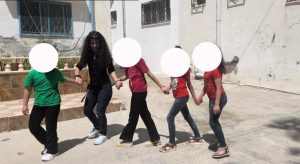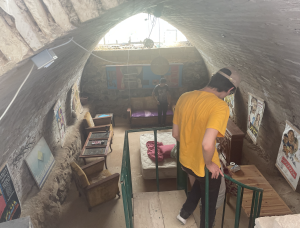Home » Articles posted by Laila Dames
Author Archives: Laila Dames
An Uber Ride- Laila Dames
“The government…it’s corrupt. Not like America. We should trade places.”
For those who are comfortable, this is a sentiment I’ve heard shared dozens of times. The lack of social freedom in Jordan is jarring to say the least. With arguably excessive levels of surveillance, Jordan does not allow for much social discourse or discussion.
On the way back from a supermarket trip, I spoke to my Uber driver about America and how life in Jordan has been. When he asked where I’d prefer to live, I said Jordan with no hesitation. It has been such an incredible feeling to not be a minority for 2 months. To be surrounded by people with similar values and morals.
He laughed a bit to himself and told me I probably wouldn’t feel that way if I lived in Jordan. He went on to tell me stories of resistance. Attempts to protest the government regarding excessive surveillance, allyship with Israel, and general corruption. He elaborated on how he feels privileged to be a member of a prominent tribe in Jordan, and how he has the privilege to protest to a greater extent than other members of society. Then he told me about his cousin, who is in prison as a result of his activities in public activism.
I sincerely appreciate his willingness to share his story with me, as it is a perspective that is not often heard. It is illegal to criticize the Jordanian government, therefore there are very few online sources on the topic from the perspectives of those living in Jordan themselves. I feel grateful that he felt comfortable sharing with me, as we had just known each other for a brief moment. It is as if he hoped that I would be able to share this with others, and that our conversation would go beyond the four doors of his Honda.
As we pulled up to our apartment on At Tarriyfah street, I wished the ride was longer. I wish I had the opportunity to ask him more about his personal experiences with the Jordanian government, and why he felt so strongly about this.
I have incredible privilege to live in a country that has as much freedom as the United States. I hope I was able to convey my gratitude for my privilege in the brief 10-minute ride we had. I also hope that somehow, the kind Uber driver who was so open and willing to share his story comes across this blog post, and is happy to see his story being released.
As I stepped out of the vehicle, I thanked the man, tipped him a bit extra, and continued on about my day; a 10-minute car ride that would forever impact my perspective on Jordan and what it means to be Jordanian.
My Privilege as an American Duke Student- Laila Dames
There are honestly so many moments in which I have realized how incredibly privileged I am to be an American Duke student. A great privilege I have is being apart of the Duke Engage program in general. Today, I spoke to my supervisor about the Duke Engage program and how our trip is fully funded. He was shocked to hear the cost of our apartment and amount we received as a stipend. Unemployment among youth is one of Jordan’s greatest issues. Therefore, most Jordanians our age do not have access to the amount of money we have and still rely on their parents for support. I recognize how lucky I am to receive enough money to live in Jordan without much stress. Still, I can’t help but feel guilty sometimes for being able to live so comfortably while the people we work with struggle to afford basic necessities. When I go on site to visit the refugee camps, sometimes I try to bring little gifts for the kids. Personally, I’d rather spend money on the communities we are working with than on myself. The most amazing part is how the smallest gesture a difference. I bought 2 packs of chalk for 2 Jordanian Dinar for the kids to play with and they were so incredibly grateful. The simplest actions that make no impact on our lives mean so much to the communities we are working with.
Outside of work, it is interesting to compare how locals are treated compared to us. One memory that comes to mind is the bus ride back from PeaceWadi. We were pulled over by police officers who asked to see our papers. However, once the officer found out we were American, he let us go without actually seeing our documents. It’s incredible how our status as Americans alter how we are treated in public. I’ve noticed that stores will also give us free pastries or extra food once they hear our broken Arabic and find out we are American. I feel like I’ve experienced Jordan hospitality to the fullest extent.
First Hand Learning Experience- Laila Dames
No matter how much research you do, it will never compare to first-hand experiences. I feel as though this is a huge lesson I have learned since being in Jordan. In America, when learning about Palestine and Palestinian refugees, I could only rely on secondhand stories and online videos. However, nothing compares to the personal stories I have heard and the connections I have made while being in Jordan. When we were first going to visit the refugee camps, I was nervous. I was terrified that the conditions would be horrifying and I would break down. Yet, when I got there, I was greeted by smiling kids eager to show me what they’re learning. They are some of the most resilient people on this planet and have been through so much hardship in their lives, yet you’d never know when you meet them. They are simply full of joy and life, inspiring me to be more like them.
I have been working on Project Masahati, or My Space. This is a program designed to provide children with a safe space to learn through play. In high school, I took a teaching course at my local community college. This class taught me about lesson planning, making infographics and flyers, and online resources for teachers. I took the class as an elective, and questioned whether it would benefit me in any way, since teaching is not a final career goal of mine. Nevertheless, I am incredibly grateful I took this course due to its immense benefit to me while I work on Masahati. Thus far, I have created various activities for the kids, created flyers, inputted data, written reports, and much more. It’s incredibly rewarding to know that the lesson plans and activities I develop will be used in a classroom environment.
My absolute favorite part of my work is definitely working directly with the kids. We visited a refugee camp with our I Learn supervisor this past week, and I had an absolute blast. We helped them out with math; honestly, I even learned a new thing or two! I noticed the way that the teachers in Jordan teach math differs from how I was taught as a kid; the Jordanian method of comparing fractions seems much easier to comprehend than what I was taught. These kids are what keeps me motivated to work. During our last visit, they had so much fun doing math they continued working even after class ended. My history teacher in high school would have us race to complete a question on the white board, so I set up the same activity during our visit. The kids LOVED it. My poor supervisor was begging me to leave (sorry Saif). The kids don’t have an outdoor area to play, but we played music and I taught the kids the “cha cha slide” while they taught me Dabke (a traditional Palestinian dance). I cannot wait to see what else these kids will teach me during my stay in Jordan, because I could confidently say they have already made a permanent impact on my life.


Palestinian Perspectives as a Palestinian-American by Laila Dames
We are roughly two weeks into our Duke Engage experience and I can already say this trip has been life altering. Prior to this trip, I have never left America before. I felt frustrated by my lack of community in the states and never felt “at home.” Since being in Amaan, I have met more Palestinians in a two-week span than I have my entire life. I’ve always felt like everything I was learning about my culture was from word of mouth, or by watching videos. People always say that experiencing something is a lot different than viewing it from a distance, and this could not be more accurate. Last week, we visited Peace Wadi and a man named Abu Farris. He told us how he could view his home in Jericho from his front porch but cannot visit due to Israeli occupation. I asked him what it was like growing up in Palestine for the first 10 years of his life and his eyes lit up at the question. He immediately explained how beautiful it was and how much he still longs to go home. He went on to show us the approved construction plans for his father’s home in Jerusalem, which was stolen by Israeli settlers.
Growing up, my parents always tried to keep us educated on our culture and what is happening to our people overseas. I remember being told stories about my grandfather’s mansion that was stolen and transformed into a sugar factory by the Israeli government. I remember my mom telling me about how my uncles were kidnapped and their homes were burned down by Israeli soldiers. I remember feeling so frustrated at the cruelty that Palestinians faced daily. Since being in Jordan, I’d say my biggest struggle is coping with the constant reminder of Israeli occupation. As amazing as it is to meet so many Palestinians, it also feels like a constant reminder of the fact that most of them are here against their will and would not be here if it weren’t for the cruelties of Zionism.
Yet, since being in Jordan, I’ve realized how much joy Palestinians maintain, even in the hardest of times. Despite Abu Farris not being able to return home, he has created a beautiful home and family of his own in Jordan. He has a date farm and a beautiful project being built on his land. We explored his property and were shown an underground “cave” that Abu Farris and his friend built and a building that Abu Farris hopes will eventually become a place to host celebrations and events. I’ve sincerely enjoyed meeting other Palestinians from similar areas as me. In fact, Abu Farris’s wife is actually from my village, Beit Hanina, in Palestine. Everyone that I have spoken to is so excited to tell me about Palestine and pray that I will be able to visit sometime. Despite the fact that they may never be able to return home again, they still hope and pray that I will be able visit and see my country with my own eyes. I’d say the biggest perspective I’ve gained thus far is the perspective of hope and resilience that Palestinians constantly exhibit, and I am so incredibly grateful to all the people I have met thus far that have been kind enough to share their stories with me.

